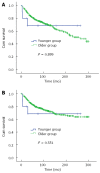Clinical characteristics and prognosis of young patients with colorectal cancer in Eastern China
- PMID: 24307803
- PMCID: PMC3848157
- DOI: 10.3748/wjg.v19.i44.8078
Clinical characteristics and prognosis of young patients with colorectal cancer in Eastern China
Abstract
Aim: To explore the clinical characteristics and prognosis of young patients with colorectal cancer patients in Eastern China.
Methods: A total of 1335 patients with colorectal cancer treated from December 1985 to December 2005 at the Second Affiliated Hospital of Zhejiang University School of Medicine were studied retrospectively. The patients were divided into two groups, a younger group (aged ≤ 30 years) and an older group (aged > 30 years), and comparison was made in the clinical characteristics and prognosis between the two groups. Chi-square test was used for data analysis of all categorical variables, and overall survival (OS) was calculated by the Kaplan-Meier method. A multivariate analysis was performed using the Cox model.
Results: There were 42 (3.1%) and 1293 (96.9%) cases in the younger group and older group, respectively. Univariate analysis showed that the 5- and 10-year OS in the younger group were 33.9% and 26.1%, respectively, and those in the older group were 60.1% and 52.2%, respectively. Younger group had poor survival (χ(2) = 14.146, P = 0.000). Multivariate analysis revealed that age was not a dependent factor for prognosis (OR = 0.866, 95%CI: 0.592-1.269, P = 0.461). Stratified analysis indicated that in stage III and IV disease, the 5- and 10-year OS were 24.6% and 14.8% in the younger group, and 40.4% and 33.3% in the older group, respectively, with a significant difference between the two groups (χ(2) = 5.101, P = 0.024). In the subgroup of radical surgery, the 5- and 10-year OS were 44.3% and 34.2% in the younger group, and 69.6% and 60.5% in the older group, with a difference being significant between the two groups (χ(2) = 7.830, P = 0.005).
Conclusion: Compared with older patients, the younger patients have lower survival, especially in the subgroups of stage III and IV disease and radical surgery.
Keywords: Clinicopathologic feature; Colorectal cancer; Prognosis; Radical surgery; Young.
Figures




References
-
- Edwards BK, Ward E, Kohler BA, Eheman C, Zauber AG, Anderson RN, Jemal A, Schymura MJ, Lansdorp-Vogelaar I, Seeff LC, et al. Annual report to the nation on the status of cancer, 1975-2006, featuring colorectal cancer trends and impact of interventions (risk factors, screening, and treatment) to reduce future rates. Cancer. 2010;116:544–573. - PMC - PubMed
-
- You YN, Xing Y, Feig BW, Chang GJ, Cormier JN. Young-onset colorectal cancer: is it time to pay attention? Arch Intern Med. 2012;172:287–289. - PubMed
-
- Neufeld D, Shpitz B, Bugaev N, Grankin M, Bernheim J, Klein E, Ziv Y. Young-age onset of colorectal cancer in Israel. Tech Coloproctol. 2009;13:201–204. - PubMed
Publication types
MeSH terms
LinkOut - more resources
Full Text Sources
Other Literature Sources
Medical

